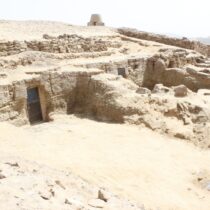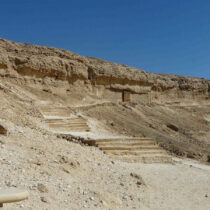“The Bronze Calyx Krater, […] was looted and smuggled into Switzerland, where it was cleaned and restored by Fritz and Harry Bürki, Zurich-based restorers and business partners of Robert Hecht. Hecht then arranged to smuggle the piece into New York, where it was sold to Leon Levy and Shelby White. It was seized by the Office in January of this year.”
This is how the press reported the return to Greece of a 4th c. BCE calyx krater, formerly held in the collection of New York mogul Shelby White. The return of the group of antiquities around a year ago had been presented as a success story of claiming stolen cultural heritage. The operation was only part of the successful action of the Manhattan prosecutor’s office to locate and repatriate antiquities that had ended up in the USA through strong networks of illegal excavators and traffickers. “They succeeded in targeting the illegal international criminal networks, whose actions alter the identity of peoples, as they remove archaeological findings from their contexts, transforming them from evidence of the history of peoples into mere works of art,” said Greek Minister of Culture, Lina Mendoni, as the Ministry of Culture cooperates with the American authorities during their operations. But is she right? Did they manage to disrupt the networks?
To answer, it is worth looking at the individuals involved in the illegal trafficking of the krater with which this text begins. Leon Levy, Shelby White, and Robert Hecht.
Hecht was relentlessly pursued by the authorities and put on trial. But he always managed to escape, so he died peacefully and free in 2012, in his apartment in Paris, at the age of 92. His wife says his talent was always to ignore what he felt he didn’t want, or shouldn’t, know.
Today, at the Metropolitan Museum of Art in New York, an entire courtyard filled with Greco-Roman art carries the names of New York power couple Leon Levy and Shelby White. While Levy has long been deceased, the ever-present White continues to be involved in numerous endeavors. She remains a member of the MET’s Board of Trustees, as well as of that of leading universities (NYU, Bard Grad. Center) and other important New York-based organizations. Additionally, she is a major donor and President of leading archaeology-related research centers. Among them are the Friends of the Israel Antiquities Authority and the Shelby White and Leon Levy Program, which sponsors excavations in Israel and funds archaeological publications at Harvard, respectively. It should be noted that after Levy’s death, White founded the Leon Levy Foundation, which funds NYU’s Institute for the Study of the Ancient World. She has also penned a book titled “What Every Woman Should Know About Her Husband’s Money”! On the occasion of antiquity repatriations, she ‘collaborates’ with the authorities who thank her for her contribution, even if regarding the possession of looted antiquities White is the gift that keeps on giving.
It is as if, in a fictional scenario set in Greece, Lord Elgin and his wife decided to portray themselves as philanthropists. Following Elgin’s passing, his wife financially supports universities in Britain in his name, provides scholarships to Greek children, and funds archaeological publications and excavation programs, while Greece’s own Archaeological Service has a Society of Friends and she becomes its president. At some point, things change, with authorities chasing her to return the antiquities she owns (and has not yet ‘donated’ to a museum). As she returns them, the authorities thank her for cooperating, simply because that way she is more likely to return the many more antiquities that she owns. She is never punished and never held accountable. Instead, she enjoys honor and glory everywhere in the world. Of course, the looting can continue with her children and grandchildren as moral perpetrators; how will the family legend be maintained without the promotion and enrichment of its collection?
The truth is that this scenario is not that fictional. Greece was very close to it at a time when tourists gave way to explorers and then to archaeologists, (who in many cases were both rich and successful). The existence of a state-led Greek Archaeological Service from very early on, alongside museums where objects are entered and documented, at least in terms of provenance, set limits to the (well-intentioned or not) cultural management initiatives by various ‘Maecenases’, as well as their collecting activity, and their interference with publications. The same is true regarding university-led archaeological research, since universities are State-led and no private ‘benefactor’ is seen as a financial lifeline in return for ‘discounts’ on unbiased research.
One might argue: “But, Greece also has private collectors and museums founded by private benefactors and housing content of dubious provenance. Also, private collections have entered state museums, state excavations are largely supported by private funding, and research is backed by private foundations, which also excel in the field of documentation and publications.” This is correct. However, all these elements do not replace antiquities management but rather complement or exist alongside it, always within limits.
In general, wealthy individuals do not yet hold the same sway over cultural management in Greece as they do in the USA, and they do not dictate the rules.
Despite these nuances, archaeological research in Greece is continually being undermined, with economic factors initiating a descent that could mirror American trends. As government funding diminishes, the pursuit of private resources gradually leads to the relaxation of constraints on various fronts: museum loans, legitimization of collections, management of archaeological sites and excavations, and presentation of objects in publications and exhibitions. The regulatory framework of major museums has already loosened, allowing for long-term loans, and historical buildings are overseen by various “funds”, with decisions of the Central Archaeological Council sometimes overturned hastily. Individuals are celebrated as national heroes for donating dubious antiquities on their own terms. Greece’s Archaeological Service could be filled with graduates of a Greek annex of the (White-funded) NYU/ISAW, should the Greek Parliament pass the proposed bill that ends Greece’s ban on private non-profit Universities. Overall, we live in interesting times, but let’s avoid excessive sentimentality.
After considering all this, can we truly claim to be fighting against antiquities trafficking? Certainly, repatriations of artifacts mark victory in battles, but not in the war. The struggle is ongoing and multifaceted, and true victory will only come when patrons like Levy, White, Stern, and many others cease to provide opportunities to figures like Hecht, Bürki, Medici, and Becchina. This will happen when museums, universities, cities, and countries no longer rely on them.
Zeta Xekalaki
*The text appeared in Greek on the website Archaiologia Online on March 23rd, 2013. It has been updated with current info and translated into English by the author. A version of this text also appears on the author’s Medium page.





